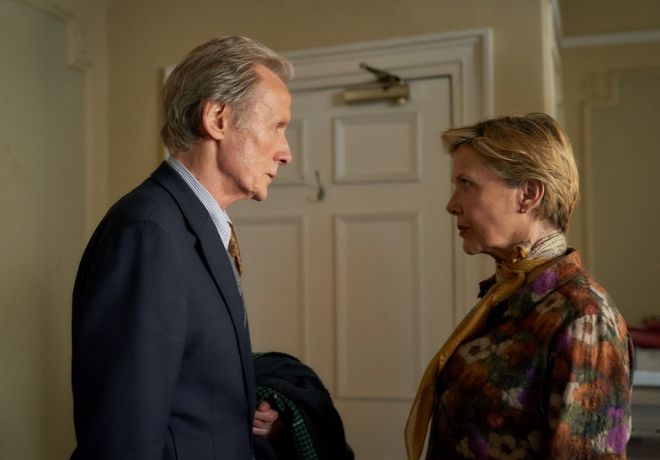Movie theater
William Nicholson with Annette Bening at one point during the filming of 'Return to Hope Gap'.
Interview with William Nicholson, screenwriter of blockbusters such as 'Gladiator' or 'Les Misérables', who directs 'Return to Hope Gap'
The film starring Annette Bening and Bill Nighy, portrays the painful divorce process of a British couple
23 years ago
William Nicholson
(Lewes, Great Britain, 1948) directed
In the Light of Fire
, a melodrama with Sophie Marceau and Stephen Dillane.
A film that won the Jury Prize and the Photography Prize at the San Sebastián festival.
So far it was Nicholson's only feature film as a director.
Despite that tape, William Nicholson
is much better known for his work as a screenwriter.
Specifically, this Briton
has been nominated twice for an Oscar
(in 1994, for the Oscar for Best Adapted Screenplay for
Twilight Lands
; and, in 2001, for Best Screenplay for
Gladiator
) and has been nominated five times in the British Bafta .
In addition, he has signed the scripts for films such as
Elizabeth: The Golden Age
,
Les Miserables
,
Invincible (Unbroken)
or
Everest
.
Titles that have triumphed at the box office and that make Nicholson
one of the most appreciated English screenwriters in Hollywood
in recent decades.
Edward (Bill Nighy) and Grace (Annette Bening) disagree on how to separate.
Now, Nicholson directs and signs the script for
Return to Hope Gap
, a drama whose
main characters are Grace and Edward, played by Annette Bening and Bill Nighy
.
The two play a married couple living in a small British town next to the beach and the cliffs of Hope Gape.
Jamie (Josh O'Connor), her son, has long since gone to live alone in the big city for work reasons.
So, in a moment of calm, when no one expects it and taking advantage of Jamie's visit,
Edward drops the bomb: he wants to separate from Grace.
From there,
the gale breaks out and Grace refuses to see reality.
According to her, that decision is up to both of them.
And neither Edward nor his son Jamie seem to agree with her.
Despite the fact that reality proves that time and lack of expectations on Edward's part have led to only one way out: divorce.
A pain that she suffers in an extreme degree
and that ends up also causing collateral damage in Jamie, the son, and even in Edward, who seems to be calmer since he dropped "the bomb."
"After having spent so many years without getting behind the camera, I found myself calm when starting a project like this. It
could have made me nervous, but I think I knew the text so well
and had rehearsed so much with Billy and Annette that I went with a lot of security on my first day of shooting, "says Nicholson, who points out that the idea of shooting this movie comes from afar.
"Many years ago I considered shooting it.
I wanted to wait until my parents died to make it.
Although they read the script, I think it would have been very difficult for my father and mother to see the story in pictures because it has a lot to do with they".
Grace (Annette Bening) and her son Jamie (Josh O'Connor).
On his idea of divorce, William Nicholson does not believe that it is a family failure.
For him "getting
divorced
is something very common. More and more. What I always see is that it
causes damage to people.
When you have the possibility to stop that damage in time, you get no one to suffer more than they should. Which is an advantage for children and also economically.
Getting divorced leads to being poor. "
"I have not wanted that
Return to Hope Gap was
just a drama to cry on. I wanted to introduce notes of humor and even some intrigue," says the British director.
"Bill Nighy and Annette Bening have made it very easy for me in that sense with nuanced performances.
It's scary to see them transform into their characters from zero to one hundred and recreate the emotion in a masterful way."
Finally, it is obligatory to ask William Nicholson
how he remembers such an extraordinary success as
Gladiator
, a film whose script he signed with David Franzoni and John Logan.
"
I am very happy that it has gone down in history as an epic story
. Of course, because of what was told in it and because of how it was directed and interpreted. But, above all, because of the music of Lisa Gerrard and Hans Zimmer. Still today I hear it on the radio and it takes me back to that time immediately. And, in case you're wondering,
I wasn't the one who wrote the famous dialogue between Commodus and Máximo
in the circus arena. That 'I'm Máximo Décimo Meridio ... 'Rather, mine was the final stretch of the film (laughs) "
According to the criteria of
Know more
Comments
This news has no comments yet
Be the first in give your opinion
0 comments

